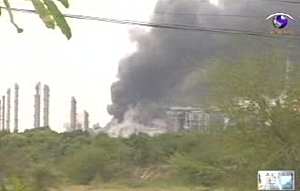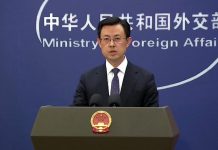BANGKOK, May 10 – Following two industrial plant accidents last weekend in the eastern province of Rayong, the environmental activist non-governmental organisation Stop Global Warming Association (SGWA) petitioned the Supreme Administrative Court Thursday, asking it to order government agencies to revoke the operations permission certificates of Bangkok Synthetics and Aditya Birla Chemicals.
Association chairman Srisuwan Janya said as representive of the petitioners, he asked the Court to order the Industry Ministry and the Industrial Estate Authority of Thailand (IEAT) to take action to revoke the licenses, while also asking it to order the Office of Natural Resources and Environmental Policy and Planning (ONEP) to reject the two factories’ reports on their impacts on health and environment.

SGWA also asked related parties to improve their response plans including risk communications, emergency preparedness, evacuation and rehabilitation to link with all plants in the Map Tha Put industrial estate.
The explosion and fire at the Bangkok Synthetics Co (BST) petrochemical factory at the Map Ta Phut industrial estate last Saturday killed 12 people, while the chemical leak the following day at the Aditya Birla Chemicals (Thailand) factory in the Hemaraj Eastern Seaboard Industrial Estate affected at least 40 workers and others with dizziness.
The association had earlier identified the two plants as among the 76 factories SGWA and other civil society groups petitioned the court asking for an injunction against the industrial plants.
Mr Srisuwan said the Central Administrative Court injunction in 2009 ordered suspension of 76 industrial projects at Map Ta Phut due to environmental concerns.
The court’s decision came after SGWA and 43 Map Ta Phut residents had filed a complaint with the Court seeking an emergency hearing and an injunction to put on hold all projects int the industrial zone saying that state agencies had failed to issue proper operating licences for the industrial projects.
The Supreme Administrative Court later allowed 11 of the 76 projects to continue operating, while 65 were to remain shuttered until they comply with the environmental and health requirements of Section 67 of the 2007 Constitution.




